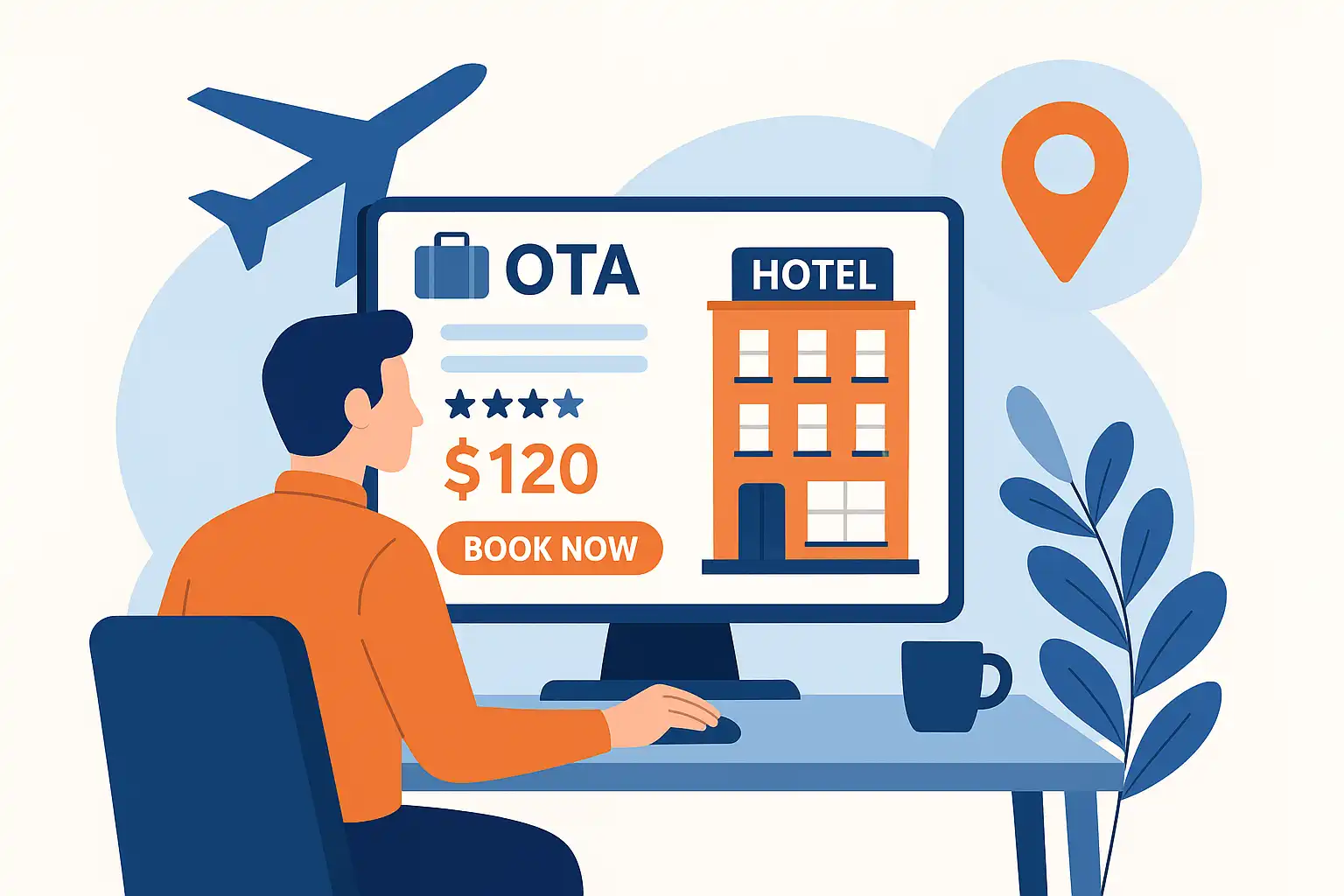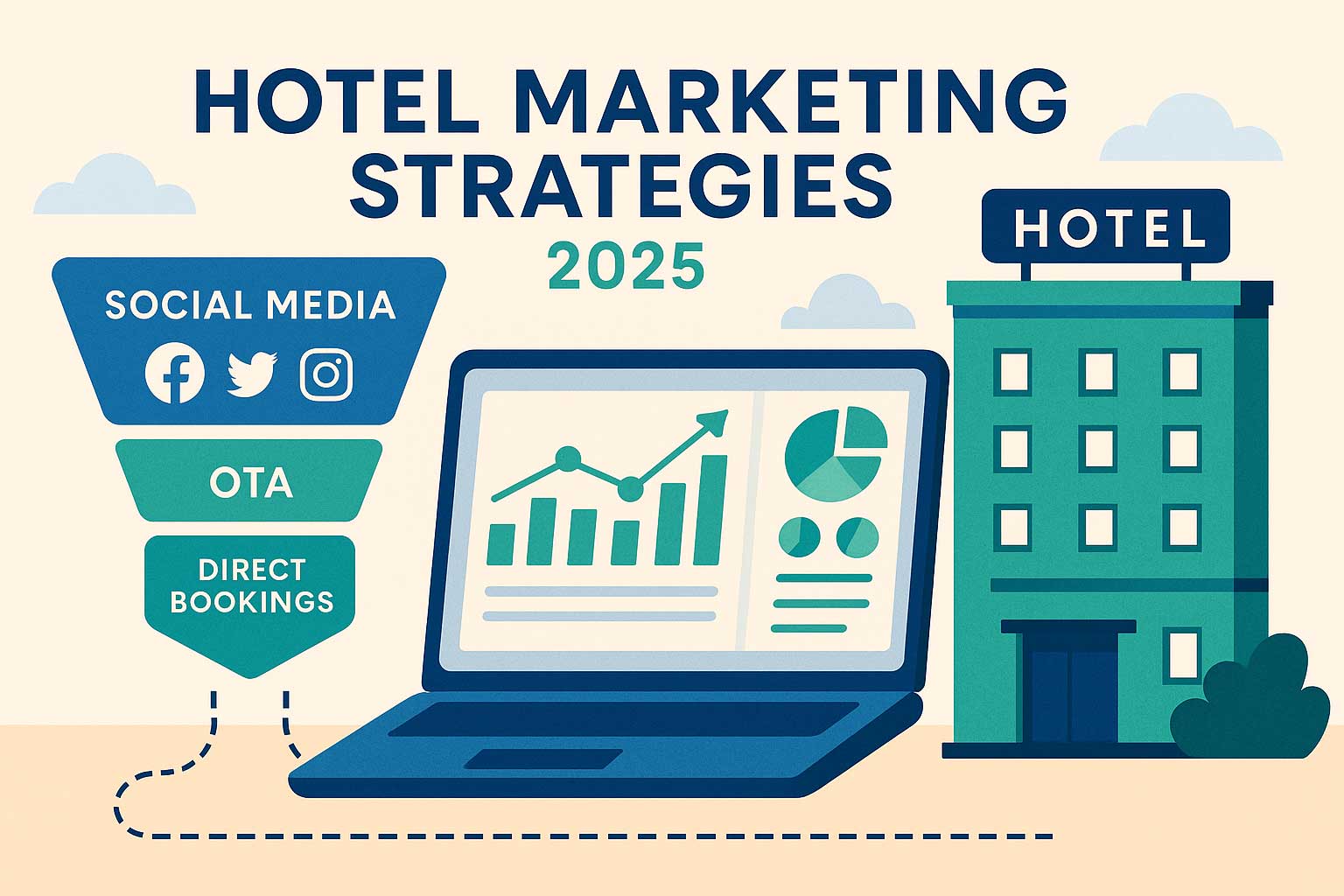Hotel Social Media Marketing Strategy: Ultimate 2025 Guide
Jul 25, 2025
 Mika Takahashi
Mika TakahashiPopular Categories
Hotel Technology & InnovationHotel Operations OptimizationDigital MarketingIndustry TrendsRevenue ManagementHospitality Industry
Popular Categories
Trending Post

Hotel Walk Letter Template: Professional Guest Communication

Online Travel Agents: What They Are and How They Work

Hotel Security Systems: Modern Protection Solutions

Hotel Advertising: Complete Guide to Boost Bookings and Revenue

25 Hotel Marketing Strategy Ideas for 2025: Complete Guide

AI Reservation Agent: Revolutionizing Hotel Booking and Guest Experience

PMS Communication: Streamlining Property Management Through Effective Guest Messaging
Table of contents
The year 2025 shows that 98% of internet users use social media platforms which transforms the way people find and research and book accommodations. Hotels face both a major business requirement and an unmatched market opportunity because of this development. Hotel social media marketing has evolved from being an optional marketing tactic into an essential revenue driver which directly affects your bottom line. It is with no doubt that social media must be a part of any hotel marketing strategy.
The hospitality industry experiences growing pressure because online travel agencies (OTAs) reduce profit margins through their commission fees. Hoteliers who are smart use social media marketing to establish direct guest connections while highlighting their unique features which leads to direct bookings that avoid costly third-party fees.
This complete guide provides all necessary information about hotel social media marketing starting with basic principles and ending with tested strategies that produce quantifiable outcomes. The guide reveals which social media platforms offer the highest return on investment for hotels while showing you how to develop compelling content that turns visitors into bookers and how to establish genuine online relationships for brand loyalty.
What is a Hotel Social Media Marketing Strategy?
Hotels use social media platforms including Instagram, Facebook, TikTok, YouTube and LinkedIn to develop brand recognition while interacting with their target audience and generating direct hotel reservations. Hotle social media marketing differs from traditional advertising because it enables hotels to maintain continuous dialogue with their guests throughout the entire booking process.
The essential elements of hospitality social media marketing consist of:
Content Creation: The foundation of hotel social media marketing consists of Content Creation which includes high-quality room and amenity photos and videos demonstrating guest experiences and hotel updates and local recommendations and seasonal promotions. Modern social media platforms use multimedia content because video posts generate much higher engagement rates than regular static posts.
Community Management: Hotel social media marketing stands apart from traditional broadcast advertising because it includes active community management through comments and direct messages and reviews. Hotel responses to guest inquiries through direct messages influence booking decisions while building brand loyalty between past guests and potential guests.
Influencer Marketing: Hotels can reach specific audiences through authentic storytelling when they partner with micro-influencers nano-influencers and larger creators. Research indicates that 69% of consumers prefer influencer content to brand-generated content which makes influencer partnerships essential for contemporary hotel marketing strategies.
Paid Advertising: The strategic implementation of platform advertising tools allows hotels to target specific audiences based on their demographics and interests and their locations and behaviors. Hotels can use retargeting ads to reach website visitors while building lookalike audiences from their most loyal customers to send traffic straight to their booking pages.
Reputation Monitoring: Hotels can handle issues promptly through social listening which helps them preserve a positive brand image across every social media platform.
Hotel social media marketing differs from traditional advertising because it allows users to interact with each other. Social media marketing enables hotels to establish real connections with guests while they produce their own content and develop guest advocates who become brand ambassadors.
Why Social Media Marketing is Essential for Hotels in 2025
Hotel social media marketing plays an essential role because it shapes how contemporary travelers select their travel destinations and booking methods. The statistics demonstrate that social media has taken control of travel planning processes.
Widespread Adoption: Hotels must treat social media as essential because 98% of global internet users use these platforms. Social media platforms have evolved into the main research platforms that travelers from all demographics use.
Visual Inspiration Drives Decisions: The platform Instagram leads the way in travel inspiration because 48% of its users find new destinations and accommodations through the platform. TikTok has established itself as a significant platform because travel-related content reached more than 200 billion views during the first months of 2025.
Generational Preferences: The travel market's largest segment consisting of Millennials and Gen Z consumers demonstrates a clear preference for visually-dynamic interactive content. Younger travelers choose authentic behind-the-scenes content along with real guest testimonials instead of traditional marketing materials.
Trust Through Authenticity: Hotels use social media to display authentic guest experiences through user-generated content which creates stronger credibility than traditional brand communications. Real guest experiences displayed on social media create strong social proof that drives guests to make booking decisions.
Direct Booking Impact: Hotels that maintain a consistent social media marketing approach experience direct booking growth while reducing their dependence on OTAs and achieving better profit margins. The relationship between strong social media presence and booking performance remains well-documented despite varying results that depend on execution quality.
Shortened Path to Purchase: The customer journey becomes smoother through booking buttons and social commerce features and native booking engines which decrease purchase barriers. Modern travelers can find hotels on Instagram and make direct bookings within minutes which simplifies the conversion process.
The hospitality industry has reached a critical point where social media marketing serves dual purposes of revenue generation and sustainable competitive advantage development in a crowded market.
Top Social Media Platforms for Hotels
Your hotel needs to determine its best social media platform by studying where your target audience spends their time and how they receive content. Your hotel social media strategy requires each platform to fulfill its unique purpose.
Instagram Marketing for Hotels
Hotels should prioritize Instagram as their most vital social media platform because it leads visual storytelling in the travel industry. The visual-first nature of Instagram matches hospitality needs because more than 70% of Instagram users use the platform to find travel inspiration before selecting their destinations.
Content Strategy: Your visual content should focus on delivering high-quality images that represent the complete guest experience. Room reveals, amenity showcases, local attractions photography, and behind-the-scenes content perform exceptionally well. Instagram Stories enable real-time engagement while Reels use trending audio and hashtags to expand your reach.
Booking Integration: Strategic use of “book now” stickers in Stories and call-to-action buttons on posts creates seamless paths to conversion.
Posting Best Practices: The content should be posted daily with 3-7 stories per week. The use of branded hashtag, location tags and trending hashtags will help to increase the discoverability of the content. High quality photos and professional visual content are non-negotiable for building credibility.
Facebook for Hotel Marketing
Facebook continues to be an effective platform for reaching diverse audience segments because adults above 30 years old tend to have more disposable income for travel. Hotels find Facebook useful because it provides complete advertising solutions and strong event management capabilities to attract both leisure and business travelers.
Advertising Capabilities: Facebook enables users to segment their audiences precisely through demographic characteristics and interest-based targeting as well as geographic location and behavioral data. Hotels can build specific audience groups from their website visitors and email subscribers and past guests before using lookalike audiences to discover comparable potential customers.
Community Building: Hotels can use Facebook groups and events to maintain continuous contact with their past guests and local businesses. Hotels can use their platform to share updates about special events and seasonal promotions and local happenings to build brand loyalty and encourage repeat bookings.
Integration Features: Facebook’s booking integration and Messenger bot capabilities streamline customer service and booking inquiries. The system uses automated responses to handle standard inquiries before directing complicated questions to human staff members.
TikTok for Hotels
Young travelers between 30 and under have made TikTok their fastest-growing social media platform which hotels need to target for this age group. The algorithm of the platform gives preference to content engagement over follower numbers which enables smaller properties to achieve viral reach.
Content Approach: Hotels should use short-form videos between 15-60 seconds to show room tours and local experiences and staff personalities and trending challenges. Hotels with limited video production budgets can succeed on TikTok because users prefer authentic content over high production value.
Algorithm Optimization: To succeed on TikTok users need to understand trending hashtags and popular audio clips and current challenges. Hotels that join relevant trends while staying true to their brand identity will reach a large audience organically.
Audience Engagement: Hotels that respond quickly to comments and join discussions on TikTok build stronger relationships with potential guests through the platform's comment culture. The platform's live streaming features enable hotels to provide real-time virtual tours and Q&A sessions to potential guests.
Essential Social Media Marketing Strategies for Hotels
Hotels need to develop complete social media strategies which extend past casual posting activities. Hotel social media accounts that achieve success through systematic approaches which match business targets and guest preferences.
Creating Compelling Content
Your hotel’s brand voice and visual identity must remain consistent across all social media platforms while adapting to each platform’s unique culture and content formats. Authentic storytelling that highlights real guest stories, staff personalities, and property uniqueness performs significantly better than generic promotional messages.
Behind-the-Scenes Content: Showcase the people and processes that make your hotel special. Staff introductions, kitchen tours, housekeeping excellence, and management insights humanize your brand and build emotional connections with potential guests. This type of content performs particularly well on TikTok and Instagram Stories.
Local Experience Showcasing: Your hotel should function as a portal to local attractions instead of being limited to accommodation services. Create content about nearby restaurants and attractions and shopping and cultural events by partnering with local businesses. The approach delivers value to followers while making your hotel appear as a local authority.
Seasonal Content Strategy: Your content calendar should match the peak booking times and local festivals and seasonal tourist attractions. Hotels that develop content which matches local events and weather patterns will affect booking decisions at both peak and off-peak times.
User Generated Content Strategy
Hotels possess their most influential social proof through user-generated content. Real guest experiences shared through authentic content build trust that surpasses what branded content can achieve. Hotels that succeed integrate UGC generation and curation as a core element of their social media approach.
Hashtag Campaigns: Develop a simple branded hashtag which guests can recall and share. The Leela’s #LeelaMoments campaign demonstrates an effective UGC strategy through its encouragement of guest content sharing about their stay experiences which gets featured on official hotel social media platforms.
Incentive Programs: Guests will create and share content when you provide them with actual rewards. Guests can earn amenity upgrades and dining credits and free night stays when they produce outstanding user-generated content. The incentive needs to be valuable enough to drive participation but the cost should remain affordable.
Content Curation Process: Create structured methods to locate guest content and obtain permission before redistributing it. The practice of proper attribution combined with enthusiastic celebration of guest posts creates goodwill while delivering authentic content for your social media feeds.
Influencer Partnerships
The hospitality industry needs strategic influencer partnerships which match both hotel brand identity and preferred audience tastes. The most effective collaborations use authentic storytelling instead of straightforward promotional content.
Micro-Influencer Strategy: The engagement rates and authentic content delivery from creators with 1,000-10,000 followers exceeds those of celebrity collaborations. Micro-influencers maintain better audience relationships through content that their followers find more relatable.
Service Exchange Models: Hotel influencer partnerships that lead to success typically use service exchanges instead of monetary payments. Hotel businesses can achieve cost-effective promotional content through service exchanges that include complimentary stays and dining experiences and spa services instead of paying for partnerships.
Campaign Objectives: Each influencer partnership requires specific goals that should focus on brand awareness or direct bookings or content creation. The company should give influencers key messaging points about their unique selling points but should also provide them with freedom to create their content.
Content Ideas That Convert
Hotel social media accounts that achieve the highest success rates produce content which simultaneously entertains their audience while converting them into customers. Hotels can maximize their social media return on investment by identifying which content types generate bookings and engagement.
Video Content Strategy
Hotels achieve 67% better booking conversion rates through video content than static images across all social media platforms.
Virtual Tours: The ability to see rooms and common areas and amenities through video tours helps potential guests to understand their stay experience. These tours work particularly well on YouTube and can be repurposed as shorter clips for Instagram Reels and TikTok.
Guest Testimonials: Real guests who share authentic video testimonials serve as strong social proof that drives potential customers to make booking choices. A structured method should exist to obtain guest testimonials either at checkout time or through post-visit communication channels.
Live Video Events: The use of live streaming for room tours and local events and Q&A sessions enables real-time engagement opportunities. Live videos achieve better organic reach on Facebook and Instagram which makes them useful for both awareness building and answering potential guest questions.
Staff Spotlights: The use of behind-the-scenes videos showing staff members helps to humanize your brand and create emotional connections with viewers. These videos work particularly well on TikTok and Instagram Stories.
Seasonal and Event-Based Content
Your hotel content strategy should match local calendars and holidays and seasonal attractions to reach peak booking demand while generating additional occupancy during off-peak times.
The content should include information about upcoming festivals and concerts and sporting events and cultural events in the nearby area. Your hotel will establish local community ties through this approach while attracting bookings from event participants.
Content development should focus on seasonal packages which include holiday celebrations and summer activities and winter attractions. Visual content featuring seasonal amenities together with local seasonal activities will boost bookings during particular time periods.
Your content should include real-time weather information along with recommendations for seasonal activities and suitable travel items. The helpful content establishes trust with customers while maintaining your hotel as their first choice during their trip planning process.
Measuring Success and ROI
Social media management needs systematic tracking of key performance indicators to establish business outcome connections with social media efforts. The most important metrics focus on conversion rather than vanity metrics like follower count.
Direct Booking Attribution: Track bookings from social media platforms by using distinct booking URLs and promo codes and UTM parameters. The collected data enables organizations to calculate specific ROI measurements which helps them optimize their budget distribution across various social media channels.
Engagement Quality Metrics: Total engagement is important but focus on meaningful interactions such as saves, shares and comments rather than just likes. These deeper engagement types typically correlate more strongly with booking intent.
Website Traffic Analysis: Use analytics tools to track how traffic moves from social media platforms to your website. Analyze the pages visited and time spent on site and conversion rates for social media traffic in relation to other traffic sources
Customer Acquisition Cost: The total social media marketing expenses should be divided by the number of new customers who joined through social channels to determine this metric. This metric helps determine the efficiency of your social media investment.
Platform-Specific Analytics: Each social media platform delivers complete analytics about audience demographics and engagement patterns and content performance. The analysis of these insights on a regular basis enables optimization of posting times and content types and targeting strategies.
Common Hotel Social Media Mistakes to Avoid
Even well-intentioned hotel social media efforts can fail due to common strategic and tactical mistakes. Understanding these pitfalls helps hotels avoid wasted resources and missed opportunities.
Inconsistent Posting Schedules: The visibility of your content decreases because platform algorithms tend to show content from accounts that post regularly. Create posting schedules that your team can sustain in the long run instead of starting with high intensity then experiencing burnout.
Ignoring Community Management: The lack of immediate responses to comments and direct messages and reviews leads to negative perceptions and lost booking potential. Social media needs continuous monitoring beyond the act of posting content.
Over-Promotional Content: Audience fatigue and reduced engagement result from sending sales messages without providing value. The 80/20 rule should be followed by creating 80% valuable and entertaining content and 20% direct promotional content.
Poor Visual Quality: The credibility of travel content suffers when images have low resolution and poor lighting and amateur photography standards are used especially for travelers who expect high standards. The company should invest in either quality visual content creation or professional photography services.
Incomplete Profile Optimization: Outdated contact information, missing booking links, and incomplete business profiles harm credibility and make it difficult for potential guests to take action. All profile information across platforms should be audited and updated on a regular basis.
Lack of Brand Consistency: Audiences become confused when different voices and visual styles and messaging appear across platforms which weakens brand identity. Create brand guidelines which preserve consistency yet adjust to platform-specific cultural elements.
Building Your Hotel’s Social Media Strategy
To create an effective social media strategy you must develop a structured plan which matches your hotel's business targets and customer taste preferences. Your focus should be on achieving excellence through 2-3 channels which serve your target audience best instead of trying to master every platform at once.
The hospitality industry now demands that hotels maintain strong social media presence to survive in today's competitive market. Hotels that integrate social media marketing as their fundamental business approach will achieve higher direct bookings and stronger brand loyalty and lasting digital market growth.
Hotel social media marketing success depends on consistent efforts along with patient dedication to genuine audience interactions. Begin with 1-2 platforms while developing high-quality content that presents your unique value proposition before expanding your social media efforts when you gain expertise and achieve desired results.
Hotels that succeed in 2025 and beyond will use social media to develop authentic relationships with travelers while creating valuable content experiences and establishing themselves as trusted local market authorities. Your hotel's social media approach should express its personality while leading potential guests to direct bookings that optimize revenue and guest connections.
